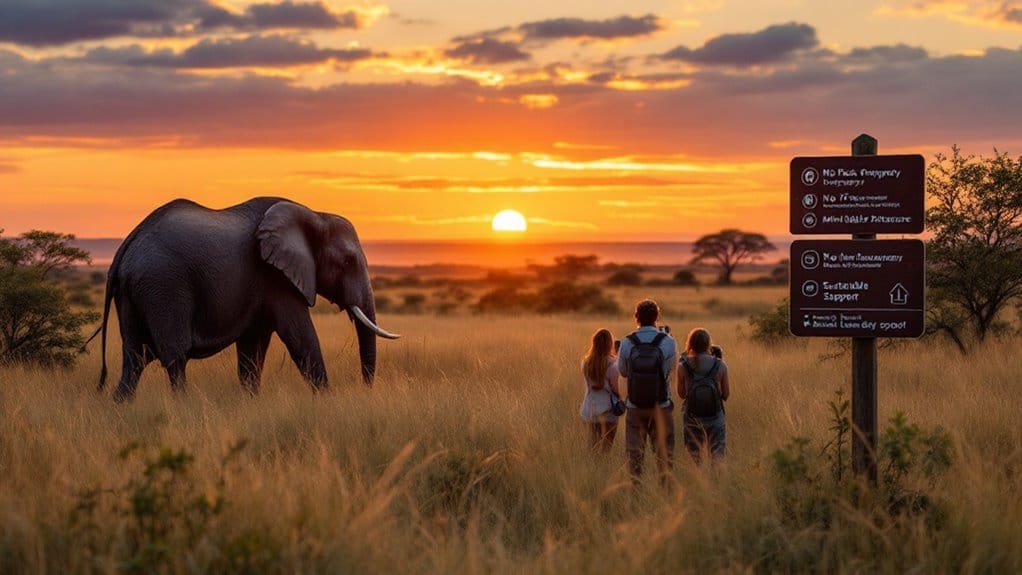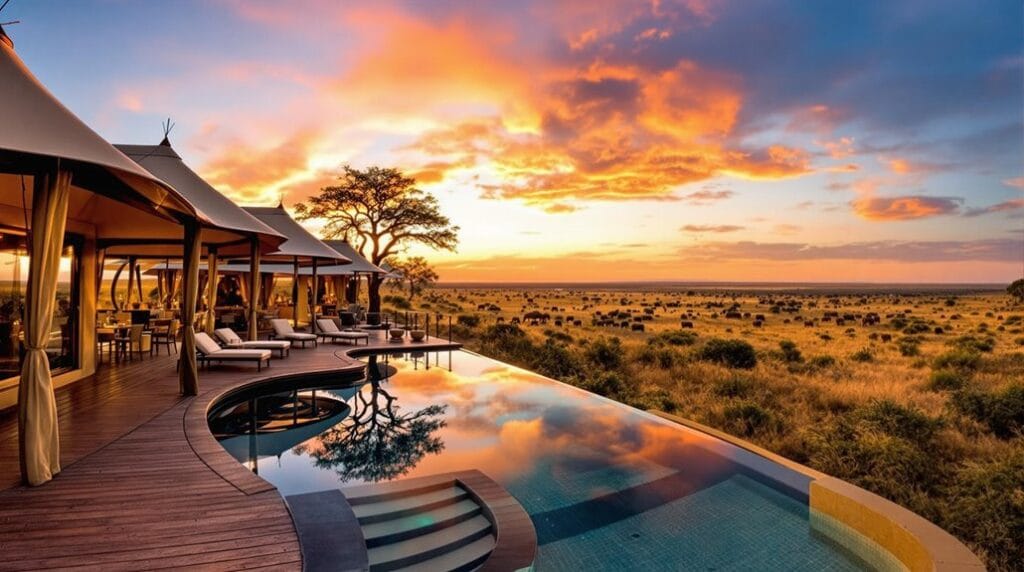To achieve ethical wildlife safaris and conservation, you should focus on three key steps. First, prioritize animal welfare by maintaining a safe distance and avoiding feeding wild animals. Second, support local communities by choosing community-owned lodges and engaging with local cultures, ensuring tourism profits benefit residents directly. Finally, assess your environmental impact by selecting eco-friendly transportation and accommodations, reducing your carbon footprint. By following these steps, you'll contribute to wildlife preservation and sustainable tourism. If you're keen to explore further, there's a wealth of information waiting to enhance your understanding.
Key Takeaways
- Choose certified safari operators that prioritize animal welfare and support local communities through equitable revenue-sharing models.
- Maintain a safe distance from wildlife and avoid feeding animals to prevent stress and dependency.
- Participate in community-led conservation projects and learn about local species at wildlife rehabilitation centers.
- Opt for eco-friendly transport and accommodations that implement sustainable practices to reduce your environmental impact.
- Engage in educational programs and workshops during safaris to enhance your understanding of wildlife protection and conservation efforts.
Understanding Ethical Wildlife Practices
Ethical wildlife practices are vital for promoting both animal welfare and sustainable tourism. When you prioritize these practices, you're not just witnessing amazing wildlife; you're actively contributing to wildlife conservation.
By choosing responsible tourism practices, you make certain that animals thrive in their natural habitats without added stress from human interaction. Maintaining a safe distance during encounters is essential for minimizing stress on wildlife, allowing them to engage in their natural behaviors.
Engaging with tour operators who adhere to ethical standards guarantees that you're supporting businesses committed to animal welfare and the preservation of ecosystems.
Additionally, you can play a part in effective conservation efforts by supporting parks that implement robust anti-poaching measures. Participating in revenue-sharing models further enhances your impact, as it guarantees that funds from tourism benefit both conservation initiatives and local communities.
Supporting Local Communities
When you choose to stay at community-owned lodges, you're directly contributing to the local economy and enhancing the livelihoods of residents.
Revenue-sharing models, like those seen in Rwanda, guarantee that tourism profits are equitably distributed, fostering both conservation and community empowerment.
Community-owned Lodges Benefits
Community-owned lodges play an essential role in supporting local economies and enhancing conservation efforts. By choosing to stay at these lodges, you're directly contributing to the well-being of local communities and their wildlife. Your tourism dollars are funneled back into community initiatives, improving infrastructure and promoting sustainable practices.
| Benefits of Community-owned Lodges | Impact on Local Communities |
|---|---|
| Direct revenue to local development | Enhances economic growth |
| Job creation through local employment | Reduces poverty and improves living standards |
| Authentic cultural exchanges | Preserves local traditions |
When you engage with community-owned lodges, you're not just a tourist; you become a part of a movement that prioritizes conservation efforts. You empower residents and help combat greenwashing by ensuring your contributions genuinely support the community. This connection fosters an unforgettable travel experience, allowing you to appreciate the rich culture and biodiversity of the area. So, when planning your next wildlife tourism adventure, consider the profound impact your choice can have on both the environment and the local communities you visit.
Revenue-sharing Models Impact
Revenue-sharing models greatly impact local communities by guaranteeing that a portion of tourism profits directly supports their development. When you support these initiatives, you're not just enjoying a wildlife safari; you're contributing to the well-being of local residents and the environment.
- Boosts investment in education and healthcare
- Improves local infrastructure for better quality of life
- Decreases poaching by involving communities in conservation
- Empowers residents with ownership of natural resources
- Fosters positive attitudes towards wildlife tourism
By participating in revenue-sharing, you help create a sustainable cycle where local communities thrive and wildlife is protected. In Rwanda, for instance, 75% of locals express positive sentiments towards tourism when they see financial benefits. This sense of belonging encourages them to engage in conservation efforts actively, leading to improved wildlife management practices.
As you consider your next safari, remember that your choices can strengthen local communities, promote conservation, and guarantee that future generations enjoy the beauty of nature. By embracing revenue-sharing models, you're not just a tourist; you're an essential part of a community committed to sustainable development.
Assessing Environmental Impact
When planning your wildlife safari, it's essential to assess the carbon footprint of your travel choices, as air travel considerably contributes to global CO2 emissions.
Opting for eco-friendly transportation and accommodations can dramatically reduce your environmental impact while supporting local conservation efforts.
Carbon Footprint Evaluation
Evaluating your carbon footprint is essential when planning an ethical wildlife safari, as travel can greatly impact the environment.
With the tourism sector accounting for around 8% of global greenhouse gas emissions, understanding your environmental impact is fundamental for conservation efforts.
Long-haul flights alone can generate approximately 2.2 metric tons of CO2 emissions per passenger, so it's imperative to reflect on your travel choices.
Here are some ways to reduce your carbon footprint:
- Choose eco-friendly transport options, like local transfers and low-emission vehicles.
- Participate in carbon offset programs to support renewable energy or reforestation initiatives.
- Adopt the "Leave only footprints" principle to minimize waste and avoid single-use plastics.
- Support accommodations that practice sustainable practices and conservation.
- Educate yourself and others on the importance of minimizing environmental impact.
Sustainable Transportation Choices
Travel choices play a crucial role in shaping the environmental impact of your wildlife safari. By opting for sustainable transportation choices, you can greatly reduce your carbon footprint and contribute to the conservation of wild habitats.
Consider using eco-friendly transport options like electric or hybrid vehicles during your safari trips. These options drastically cut carbon emissions compared to traditional fossil fuel-powered cars.
Additionally, think about engaging local transfers that not only minimize travel distances and emissions but also support local economies by employing local drivers and guides.
It's essential to research the carbon footprint of your travel choices, especially since long-haul flights can generate a substantial amount of CO2. For instance, a round-trip flight from New York to Nairobi can produce about 2.5 tons of CO2 per passenger.
When selecting accommodations or tour operators, prioritize those that embrace sustainable transport practices, such as solar-powered vehicles or promoting walking safaris.
Finally, consider participating in carbon offset programs offered by airlines and tour companies, which invest in renewable energy or reforestation projects to help balance the emissions caused by your travel.
Eco-friendly Accommodation Options
Choosing eco-friendly accommodation options is essential for minimizing your environmental impact during a wildlife safari.
By selecting lodges that prioritize sustainability, you not only enhance your experience but also contribute to conservation efforts that protect wildlife and their habitats.
Here are some key considerations when choosing eco-friendly accommodations:
- Renewable Energy: Look for places that use solar or wind power to reduce their carbon footprint.
- Water Conservation: Opt for lodges with rainwater harvesting systems and water-efficient fixtures, essential in ecologically sensitive areas.
- Local Materials: Select accommodations that utilize local building materials and designs, blending seamlessly with the environment.
- Waste Management: Support establishments with composting and recycling programs to minimize landfill contributions.
- Community Initiatives: Choose lodges that reinvest profits into local conservation projects, ensuring a positive impact on wildlife protection.
Responsible Wildlife Interactions
Engaging with wildlife responsibly is essential for both your safety and the well-being of the animals. To guarantee responsible wildlife interactions, maintain a distance of at least 20 meters from animals. This practice minimizes stress for the wildlife while keeping you safe. You can still enjoy close observations by using binoculars or cameras with zoom lenses, allowing you to appreciate their natural behaviors without intruding.
Avoid feeding wild animals, as it disrupts their natural feeding habits and can lead to dependency on human handouts. This can escalate human-wildlife conflicts, which no one wants.
Additionally, steer clear of hands-on experiences like touching or riding wildlife, as this can transmit harmful diseases and disrupt their natural behaviors.
Instead, support wildlife sanctuaries that prioritize animal welfare over profit. By doing this, you contribute to responsible tourism practices that protect wildlife from harmful interactions.
Every effort you make towards ethical safaris and supporting conservation helps create a sustainable environment for both animals and humans. Join a community that values these principles, guaranteeing that every adventure enhances your connection with nature while safeguarding its inhabitants.
Ethical Photography Guidelines
When photographing wildlife, you must capture images without interfering with their natural behaviors.
Always respect the animals' space and seek informed consent when photographing people to honor their privacy.
Capture Without Interference
Capturing wildlife images ethically requires both awareness and respect for the animals' natural behaviors and habitats.
To truly immerse yourself in ethical wildlife photography, you need to prioritize the well-being of the animals you wish to photograph. Here are some guidelines to help you capture without interference:
- Maintain a safe distance of at least 20 meters to avoid stressing wildlife.
- Use binoculars or zoom lenses to observe without intruding on their space.
- Educate yourself about local wildlife and their behaviors to anticipate movements.
- Avoid editing out barriers, as this misleads others about safe interactions.
- Make conscious choices that reflect a commitment to animal welfare and respect for their environment.
Seek Informed Consent
Informed consent is vital in ethical photography, as it not only respects the dignity and autonomy of individuals and communities but also fosters deeper connections and trust. When you're on a safari, always guarantee that you obtain informed consent from those you wish to photograph. This means clearly communicating how their images will be used and shared.
Travel companies play an important role in promoting this practice, helping to create an environment where individuals feel empowered to say yes or no.
Respecting cultural sensitivities is key in this process. Approach photography with an awareness of local customs and practices, which can greatly enhance mutual respect. This approach not only enriches your experience but also builds trust between you and the communities you encounter.
Moreover, avoid staging or manipulating scenes; authenticity matters. As you educate yourself on ethical photography practices, share this knowledge with fellow travelers.
Respect Wildlife Behavior
Respecting wildlife behavior is a cornerstone of ethical photography practices. When you engage in animal encounters, it's essential to prioritize the well-being of the wildlife you're capturing.
Here are some guidelines to keep in mind:
- Maintain a safe distance of at least 20 meters to reduce stress on animals.
- Use binoculars or high-zoom cameras for intimate observations without intruding.
- Educate yourself on signs of distress to guarantee your actions don't disrupt their natural behaviors.
- Avoid editing out barriers in your photographs to prevent misleading viewers.
- Always seek informed consent when photographing local communities, respecting their dignity and awareness.
Choosing Sustainable Accommodations
When planning your safari, choosing sustainable accommodations is vital for minimizing your environmental footprint and supporting local communities.
Opt for eco-friendly lodges and camps that implement sustainable practices like solar energy, water conservation, and effective waste management systems. These efforts notably reduce the impact on fragile ecosystems.
Look for properties that are community-owned or operated. These lodges often reinvest a portion of their profits into local development and conservation initiatives, directly benefiting the surrounding communities.
Certifications from recognized sustainability programs or tourism boards can also guide your choices, ensuring adherence to ethical standards in wildlife protection and community engagement.
Additionally, consider staying in conservancies that prioritize wildlife conservation. These areas usually employ local residents and support anti-poaching efforts while offering a more intimate safari experience.
Before booking, research each lodge's policies on wildlife viewing and interactions. Responsible tourism practices are vital for minimizing stress on wildlife and their habitats.
Engaging With Local Conservation Efforts
Sustainable accommodations not only provide a comfortable stay but also serve as a gateway to engaging with local conservation efforts. By immersing yourself in the community, you can directly contribute to the preservation of endangered species and the protection of wildlife.
Here's how you can get involved:
- Visit wildlife rehabilitation centers to learn about local species and their challenges.
- Participate in community-led conservation projects that empower locals and promote sustainable practices.
- Support initiatives like the Lewa Wildlife Conservancy, which has successfully increased the black rhino population by 38%.
- Join eco-friendly tours that focus on educating travelers about local ecosystems and conservation issues.
- Volunteer or donate to organizations dedicated to wildlife protection, helping mitigate poaching and habitat loss.
Engaging with local conservation efforts not only enhances your travel experience but also fosters a sense of belonging in the global community committed to wildlife protection.
Selecting Ethical Safari Operators
How can you guarantee that your safari experience is both ethical and enriching? Start by researching safari companies that are licensed and certified. This confirms they adhere to ethical practices in wildlife viewing and actively contribute to conservation efforts.
Look for operators that emphasize small group sizes and guided tours, which minimize disturbance to wildlife and enhance your overall experience.
Prioritize those that support local communities by employing local guides and sharing safari revenues with conservation projects and community initiatives. This not only enriches your journey but also fosters a sense of belonging to the ecosystem you're visiting.
Evaluate each operator's track record regarding animal welfare; avoid companies that engage in unethical practices such as lion walking or elephant rides. Instead, seek operators that are transparent about their conservation contributions, detailing the impact of tourism on local ecosystems, including their anti-poaching efforts and habitat preservation initiatives.
Evaluating Wildlife Conservation Programs
Choosing an ethical safari operator sets the stage for a meaningful wildlife experience, but understanding the effectiveness of wildlife conservation programs enhances that journey even further.
Analyzing wildlife conservation programs involves a multi-faceted approach that guarantees you're supporting initiatives that truly make a difference.
Consider these key factors when evaluating conservation efforts:
- Impact on biodiversity: Are endangered species populations monitored within protected areas?
- Anti-poaching initiatives: What measures are in place to combat illegal hunting, and how effective have they been?
- Local communities: How are local residents involved in decision-making, and what financial benefits do they receive from tourism?
- Transparency: Are the funding sources clear, and how are funds allocated toward wildlife protection and community development?
- Educational components: Do programs offer opportunities for visitors to learn about wildlife protection and sustainable practices?
Promoting Responsible Travel Choices
Responsible travel choices play an essential role in the preservation of wildlife and ecosystems. To make a positive impact, select safari operators that demonstrate ethical practices and prioritize wildlife welfare. Avoid unregulated companies that can harm delicate ecosystems and animals.
Engaging with local communities is vital; consider staying in community-run lodges or camps. This guarantees tourism revenues benefit residents directly and promote sustainable development. Always verify the licensing and certifications of tour operators. Reputable companies invest in anti-poaching and conservation efforts, while budget options might compromise animal welfare and ecological integrity.
Additionally, be mindful of your travel choices' environmental impact. Research transportation methods and accommodations to minimize your carbon footprint and support eco-friendly practices.
By advocating for responsible tourism, you can share knowledge about ethical wildlife experiences, inspiring others to participate in conservation efforts during their travels.
Every choice you make contributes to wildlife welfare and the future of our planet. When you commit to responsible travel, you foster a sense of belonging within a community of like-minded individuals dedicated to protecting the natural world.
Together, we can guarantee the survival of wildlife and the ecosystems they inhabit.
Frequently Asked Questions
How to Choose an Ethical Safari?
To choose an ethical safari, read safari company reviews, check wildlife interaction policies, and guarantee local community benefits. Prioritize operators supporting conservation funding initiatives to make a positive impact on wildlife and communities during your adventure.
What Is the Code of Ethics for Wildlife Conservation?
The code of ethics for wildlife conservation emphasizes wildlife protection through conservation guidelines that prioritize ethical practices. You'll guarantee animal welfare by respecting their natural behaviors and supporting sustainable tourism initiatives that promote ecological balance.
Is It Ethical to Go on Safari?
Going on safari can be ethical if you choose experiences that respect wildlife interactions, prioritize conservation education, and embrace responsible tourism. Your choices directly influence ecosystems, ensuring future generations enjoy the same breathtaking encounters.
How to Engage in Ethical Wildlife Tourism Without Harming Ecosystems?
To engage in ethical wildlife tourism, prioritize sustainable practices. Support local communities by choosing eco-friendly tours that promote conservation funding, and capture wildlife photography responsibly, ensuring you respect habitats and contribute to preserving biodiversity.
Conclusion
By embracing ethical wildlife safaris, you're not just a traveler; you're a guardian of the planet! Your choices can spark monumental changes, transforming entire ecosystems and uplifting communities. Think about it: every responsible interaction and conscious decision fuels conservation efforts and protects precious wildlife. So, don't just pack your bags—pack your commitment to making a difference. With each safari, you have the power to create a ripple effect that echoes through generations. Choose wisely; the future depends on it!








